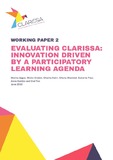Evaluating CLARISSA: Innovation Driven by a Participatory Learning Agenda
| dc.contributor.author | Apgar, Marina | |
| dc.contributor.author | Snijder, Mieke | |
| dc.contributor.author | Kakri, Shanta | |
| dc.contributor.author | Macleod, Shona | |
| dc.contributor.author | Paul, Sukanta | |
| dc.contributor.author | Sambo, Anna | |
| dc.contributor.author | Ton, Giel | |
| dc.coverage.spatial | Bangladesh | en |
| dc.coverage.spatial | Nepal | en |
| dc.coverage.spatial | Myanmar | en |
| dc.date.accessioned | 2020-06-25T14:55:41Z | |
| dc.date.available | 2020-06-25T14:55:41Z | |
| dc.date.issued | 2020-06-25 | |
| dc.identifier.citation | Apgar, M. et al. (2020) Evaluating CLARISSA: Innovation Driven by a Participatory Learning Agenda, CLARISSA Working Paper 2, Brighton: Institute of Development Studies | en |
| dc.identifier.isbn | 978-1-78118-654-1 | |
| dc.identifier.uri | https://opendocs.ids.ac.uk/opendocs/handle/20.500.12413/15456 | |
| dc.description.abstract | Children end up in child labour as a result of many, often unknown or hidden, interactions between multiple actors and multiple factors within households, communities, and labour systems, leading to unpredictable outcomes for children and other sector stakeholders and sometimes resulting in the worst forms of child labour (WFCL). It is a complex problem, and interventions aimed at tackling it are also, inevitably, complex and challenging. The way they influence change is non-linear, causality is uncertain, and unintended consequences may result. Programmes such as the Child Labour: Action-Research-Innovation in South and South-Eastern Asia (CLARISSA) that are engaging with such intractable challenges and aim to reach the most left behind (children in WFCL) are operating in conditions of complexity. This complexity poses significant challenges to the way programmes are designed, planned, implemented, and evaluated, and requires a move away from linear and predetermined models. In this Working Paper, we share our experience and early learning about how to design and implement monitoring, evaluation and learning that intentionally embraces the challenge of complexity. | en |
| dc.description.sponsorship | UK Department for International Development | en |
| dc.language.iso | en | en |
| dc.publisher | Institute of Development Studies | en |
| dc.relation.ispartofseries | CLARISSA Working Paper;2 | |
| dc.rights | This is an Open Access paper distributed under the terms of the Creative Commons Attribution 4.0 International licence (CC BY), which permits unrestricted use, distribution, and reproduction in any medium, provided the original authors and source are credited and any modifications or adaptations are indicated. | en |
| dc.rights.uri | http://creativecommons.org/licenses/by/4.0/ | en |
| dc.subject | Children and Youth | en |
| dc.subject | Participation | en |
| dc.subject | Work and Labour | en |
| dc.title | Evaluating CLARISSA: Innovation Driven by a Participatory Learning Agenda | en |
| dc.type | Series paper (non-IDS) | en |
| dc.rights.holder | Institute of Development Studies | en |
| dc.identifier.team | Participation | en |
| rioxxterms.funder | Default funder | en |
| rioxxterms.identifier.project | Default project | en |
| rioxxterms.version | VoR | en |
| rioxxterms.funder.project | 9ce4e4dc-26e9-4d78-96e9-15e4dcac0642 | en |
Files in this item
This item appears in the following Collection(s)
-
Child Labour [51]
-
IDS Research [1671]
Except where otherwise noted, this item's license is described as This is an Open Access paper distributed under the terms of the Creative Commons Attribution 4.0 International licence (CC BY), which permits unrestricted use, distribution, and reproduction in any medium, provided the original authors and source are credited and any modifications or adaptations are indicated.


